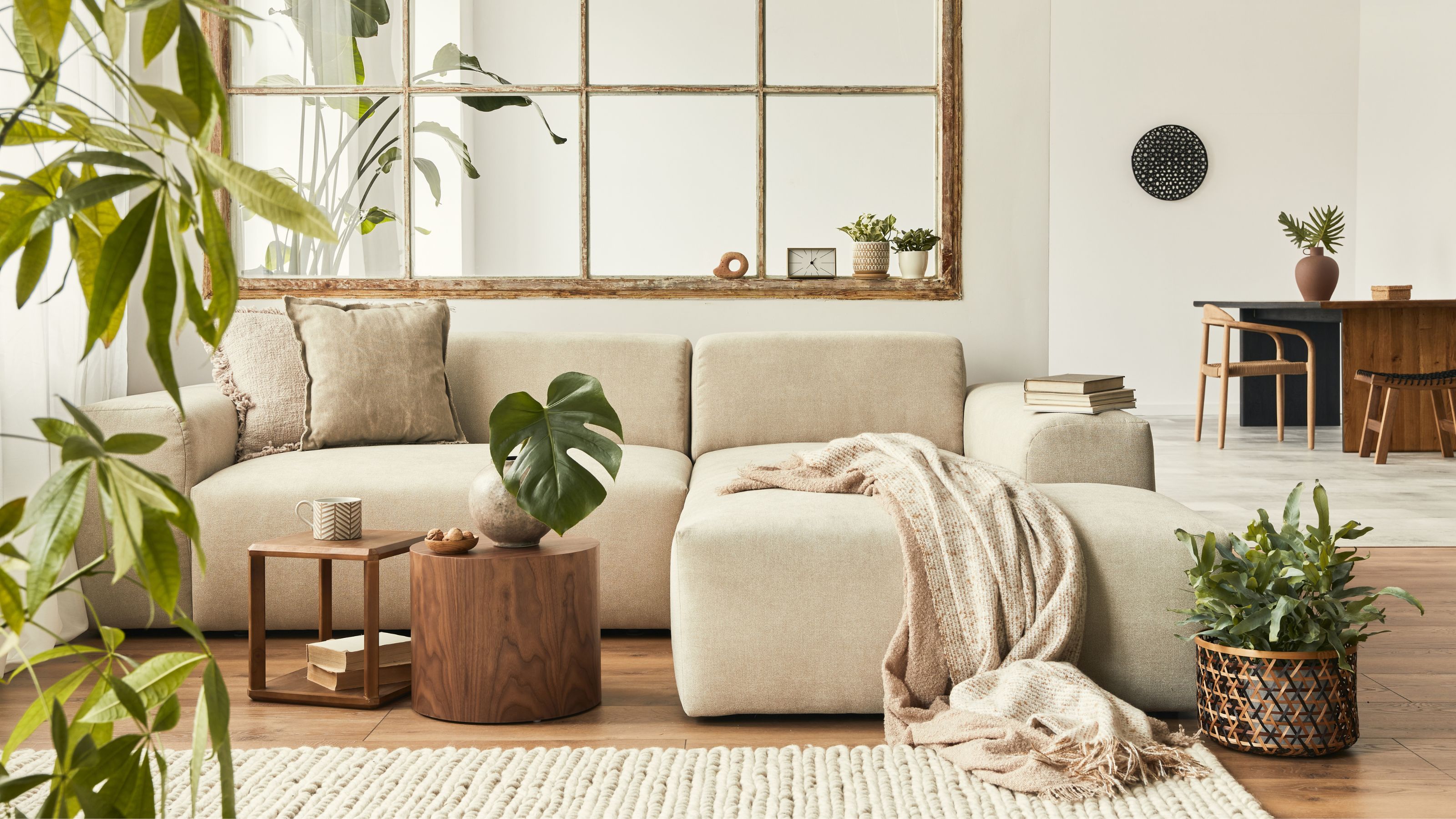Feng shui apartment ideas for all the positive vibes
Relax and unwind


When doing cleaning our living spaces, we all feel better about ourselves and assure the good vibes are coming our way, which is a key ingredient to overall healthy living. With this in mind, a great way to bring good vibes and balance into your home is by applying feng shui to your studio, apartment, dorm, or rental.
Feng shui is an ancient Chinese method of balancing the energy of the home to enhance relationships, increase prosperity, and achieve better health. It requires careful calculation of energies based on celestial currents. With apartment living becoming more common, especially in urban settings, feng shui expert Samantha Conroy-Helstrip shares some tips on how you can create good feng shui in your apartment.
Ensure your apartment faces your favorable direction
Each person has a personal trigram number determined by their year of birth and gender. In Chinese metaphysics, it is said that we capture a specific energy blueprint at the time we are born, based on planetary movements and geomagnetic influences. We can make the most out of these energies when our homes match the directions specific to our personal trigram number. Use this calculator to find out your personal trigram number. Each number belongs to one of two groups: East Group and West Group.
Ideally, your apartment should face one of your favorable directions. The facing of your apartment is determined by the front entrance of the apartment building. Fear not if it is in your unfavorable direction. Use an entrance into the building that is in your favorable direction. You can also align your office desk to your most favorable direction, or your head pointed towards your favorable direction when you sleep.
Know thy neighbor
Pay attention to what surrounds your apartment building, as this influences the quality of chi that enters your apartment. It is better to avoid living near places like hospitals, cemeteries, power plants, or garbage dumps. These places typically carry unhealthy energy, and unfortunately, the only feng shui cure for this is to move out to a better location!
Ground your intention
Your apartment is an energetic container, holding all your hopes, dreams, and visions of the future. Claiming a space as yours is important in feng shui because it helps ground your energy into this sacred container. Before energetically "landing" in your apartment, Conroy-Helstrip highly recommends clearing the space of predecessor energy. Spaces hold the energy imprint of the past inhabitants. Space clearing is a method of removing the stale, stagnant energy of the past so that you can dedicate your intentions and affirmations to your apartment.
Conroy-Helstrip uses a combination of frankincense and tingsha bells to clear a space. Always keep the windows open when using incense so that the old energies can float out (and no smoke alarms go off!). The sound frequency created by the bells breaks up any stuck energies, creating a clean slate for you to set your intention for each room.
Get small space home decor ideas, celeb inspiration, DIY tips and more, straight to your inbox!
To set your intention for your apartment, allow yourself to visualize how the best version of yourself would use this space. Use that visualization to help guide you in creating a nurturing space for yourself. If you are a couple, doing this exercise together can help clarify your shared visions of a future together, thus creating a more intimate bond between the two of you.
Have a landing area
In feng shui, the area where chi "lands" before it enters a building is called the "Ming Tang," or Bright Hall. It is an area where the chi is welcomed. In apartments, this area might be non-existent. No matter how small your apartment is, there are a few things you can do to define your Ming Tang.
Paint a section of the entryway a contrasting color. The contrast helps define the boundary between the entryway and where the rest of your apartment begins. You can also add small pieces of furniture, provided they don’t block the entryway. Place a small table to put keys on, a mirror to check your reflection before you leave, and a colorful rug. As a result, you'll have your very own Bright Hall.
The key here is to create a defined space, no matter how small, that is dedicated to what you need to do before you go out and when you come back in. Energy works the same way, it follows where our eyes go.
Command position
Arrange your bedroom, living room, and home office in what is known as the "command position." In a living room, this means positioning your sofa against a solid wall and being able to see the door without being in direct line with the door. Being directly in line with the door puts us in the path of "rushing chi," which may contribute to feelings of tiredness, lack of concentration, and not being able to relax. It is said that the command position activates our parasympathetic nervous system, which puts us in a state of relaxation that helps our bodies heal.
In the bedroom, your bed’s headboard should be against a solid wall, and you should be able to see the door from the bed, without the door opening directly in line with the bed. The bed should be accessible from both sides.
If you work from home, your desk should be at a 45-degree angle to the door, and your back should face a solid wall. You should be able to see the door from your desk. Sometimes having a command position is not always possible. If you can only position your sofa or desk in front of a window, try installing heavy curtains or using a screen to protect your back.
Separate zones
When working from home became more common, a lot of people were working from their kitchen counters, sofas, and even their beds. From a feng shui perspective, working from your bed should be avoided. The bedroom is one of the most important places in feng shui because it is where we rest and recover. Bringing in the active energy of work can disturb our sleep, making it harder for us to switch off from work. If the bedroom is the only space you can work from, Conroy-Helstrip recommends creating a separate space away from your bed. The view from your desk shouldn’t be your bed, as this probably won’t help keep you awake and motivated. Try adding a partition to create a boundary.
Similarly, if you work in the kitchen or living room, try to designate a separate space where your work items are not mixed in with remotes and kitchen utensils as this could make you overwhelmed. Have a "clocking on" ritual where you tidy away the non-work items and a clocking off ritual where you put away your computer. This ritual helps create separation in a multifunctional space.
Bring in some green
Plants bring living chi into a space. NASA-approved plants such as peace lilies, bamboo palms, and Chinese evergreens absorb carbon dioxide, release oxygen, and can also remove chemicals such as benzene, formaldehyde, and trichloroethylene from the air. Besides, they are much prettier than air purifiers. Always remember to water and re-pot them when needed! Wilting plants carry the energy of dying chi, which you don’t want in your apartment.
Clear the clutter
Clutter is a modern-day problem, as it creates chaos and overwhelms. From an energy perspective, clutter creates stagnation. Chi cannot flow freely when it encounters clutter, which means that it is harder for the nurturing benefits of free-flowing chi to reach you. Too much clutter blocks growth, healing energy, and opportunities from coming your way.
Whilst parting with our possessions can be hard, sometimes a brutal approach is necessary. If you haven’t used an item for over 18 months, chances are you probably won’t use it in the next 18 months. Selling or donating to charity are great ways to rid yourself of the heaviness of clutter. The lightness and freedom you will feel after can even be addictive! When you release what you do not need, you send a message to the universe about your firm boundaries and create more space for opportunities to come to you. A full cup cannot hold more water.
Choose decor mindfully and with intention
Now that you’ve cleared all that clutter, it is time to bring in a selection of decorative objects and art that you truly love and that inspire you. Think of these items as the physical representations of hopes and dreams that you are cultivating. These items are symbolic cues to help motivate you and attract what you want. For example, you might display a picture of a couple in your bedroom if you are single and looking for a partner.
The power of negative ions
Many of us live in areas where there is an overabundance of positive ions. Pollution, overcrowding, central air conditioning, TV screens, synthetic fibers, and electronic equipment are some of the examples that cause excess positive ions in the air. High concentrations of positive ions are linked to migraines, nausea, dizziness, allergies, and chronic fatigue. In contrast, when we are near a waterfall, by the sea, or in the mountains, the air is filled with negative ions. We experience this as that fresh, energizing feeling we get when we are in these places. Negative ions are said to help accelerate the intake of oxygen into our bodies and provide a faster recovery to our bodies. It is also linked to improving our overall mood, and alertness, and helping us to feel more relaxed.
An effective method of increasing the levels of negative ions in our apartments is to open the windows after a storm. The air after rainfall is charged with negative ions. You could also bring in a beautiful water feature to your living room. Circulating water helps with the flow of chi in any space. However, avoid placing water features in a bedroom. The Yang (active) energy of moving water is said to disturb the Yin (passive) activity of sleeping.

About Me:
Hello! My name is Aida M. Toro and I am a freelance writer that loves cultivating stories about amazing people, fashion, interiors, art, and food. I currently write for Harper’s Bazaar Vietnam, The House Magazine, Hobnob Magazine, The C-Word, and Real Homes. I live in West New York, New Jersey, which is literally a 10-minute ferry ride or 20-minute bus ride away from New York City. Although I was born and raised in West New York, I consider NYC my home, as I believe it to be the place where all dreams come to fruition, and of course, spend most of my time in. When I’m not writing, I love perusing the city streets and taking snaps with my iPhone of street art along with random things, scoping out new restaurants as well as their spaces, shopping at some of my favorite stores, spending time with family and friends, walking my cockapoodle Benji, and working out at Lifetime or DOGPOUND, which are some of the top fitness spaces in Manhattan and overall the U.S.